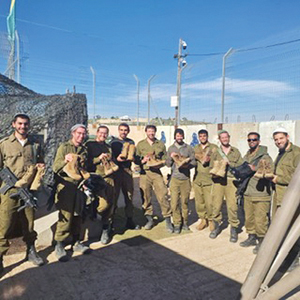
Last week, the Young Israel of New Rochelle’s Ruach program invited Yakir Wachstock of Holliswood, Queens, founder of “Boots for Israel,” to speak and run a boot-packing activity. New Rochelle’s Ruach program, run by YINR member Anya Wiebke, organizes special events during the weekdays several times a month. These events are attended mostly, but not exclusively, by retirees in the community, though they are open to all members. Wiebke invited the eighth grade of Westchester Torah Academy to join Ruach in this unique boot-packing event.
Wachstock, along with three “Boots for Israel” volunteers, brought over 100 pairs of boots to the shul. “Boots for Israel” is a grassroots organization that raises money and buys new boots to send to the soldiers in Israel. It has become Israel’s biggest overseas supplier of military-grade army boots, with over 400 volunteers.
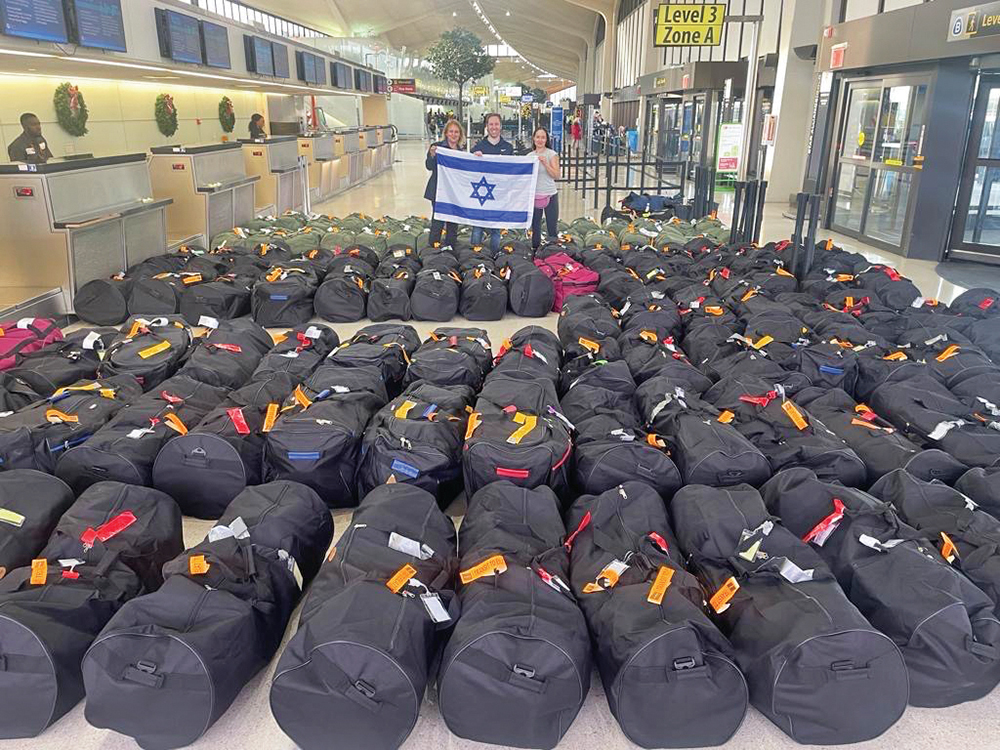
Stephanie Minkove, a member of the YINR and an old friend of Wachstock, introduced him at the Ruach event. “The message of Yakir’s story,” said Minkove, “is that all of us can contribute and can do something about the situation that we see. … Yakir is an example of seeing a problem and dealing with it.”
Wachstock spoke about how he started “Boots for Israel.” He began by discussing the COVID pandemic. As an OT who works in yeshiva elementary schools, Wachstock found himself without work during COVID. His younger brother, a dentist, made extra money by selling items on the side. During this time when Wachstock wasn’t bringing in his usual salary, his brother taught him how to go about Amazon reselling.
Wachstock explained that on Oct. 11, his WhatsApp buzzed at 2:30 a.m. (he keeps it on as a Hatzalah member). There was a personal text to him from Maj. Daniel Jacobs from the IDF, a man who Wachstock had never met. Jacobs had heard about Wachstock from his brother in Israel, and texted to ask if he could get army boots for the men in his battalion. Jacobs explained that he had heard that Wachstock knew how to work with Amazon and could possibly provide some.
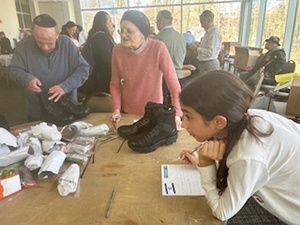
“Army boots?” Wachstock responded. “I sell Barbies and pots and pans! I don’t know anything about army boots.” Jacobs pressed on, “I don’t know who else to ask. I have nowhere else to turn.”
After staying awake the rest of the night, Wachstock placed a call the next morning to his friend Avi Shakarov. Shakarov sells high quality shoes and Wachstock thought that maybe he could help him find an inroad in the army boots business. Shakarov told him that he had recently bought many pairs of quality army boots from a brand in Italy and had been selling them for profit on Amazon. He volunteered to give him his remaining 88 pairs to send to Israel.
The two men brought the boots in several duffels to JFK Airport and approached various Americans flying to Israel, asking them to take them to Israel. None felt comfortable accepting strange duffels that they hadn’t packed, so the men went to speak to the El Al representatives. The El Al reps told them to find Israelis and ask them since they wouldn’t be bothered by the rules the way the Americans were. Sure enough, the first Israeli they encountered was happy to take the duffels. Wachstock’s sister-in-law, Michal Wachstock, of Modi’in, met the duffels at Ben Gurion Airport in Israel, got them through the necessary red tape, and brought them to Jacobs’ base.
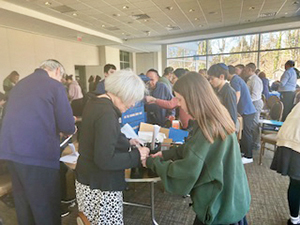
When Jacobs called Wachstock to thank him on behalf of his entire battalion, he mentioned that there were many more soldiers who needed new boots. Wachstock, with Shakarov’s help, decided to take on the job of finding the right boots and fundraising to pay for them. “As of today, we have delivered 46,000 pairs of boots to our chayalim, one to one, exactly corresponding to their exact shoe sizes,” said Wachstock. “It’s important to think not in terms of 46,000. It’s your one brother, nephew, niece, sister 46,000 times over.”
Wachstock explained that this wouldn’t have been possible without the “Boots for Israel” team. They are people who provide free space in warehouses, free trucking, wholesale pricing, and all types of free labor.
The word eventually spread, and schools started to get involved, asking for boot-packing events. Additionally, the volunteers became familiar with the El Al staff and El Al began giving them allotments for multiple bags every week. When the boots come off the plane in Israel, the Israeli volunteers pick them up from the airport and bring them to a warehouse in Modi’in. The soldiers come to Modi’in and pick up the boots to bring to their bases.
Although the IDF supplies the soldiers with army boots, it was not prepared for the massive call-up after Oct. 7. “It’s not that they didn’t have boots,” said Wachstock, “Some of them had great boots, but … some of these soldiers have been fighting in Gaza or Lebanon for so many weeks that their boots have fallen apart or given them blisters or they have duct tape on them to hold them together.
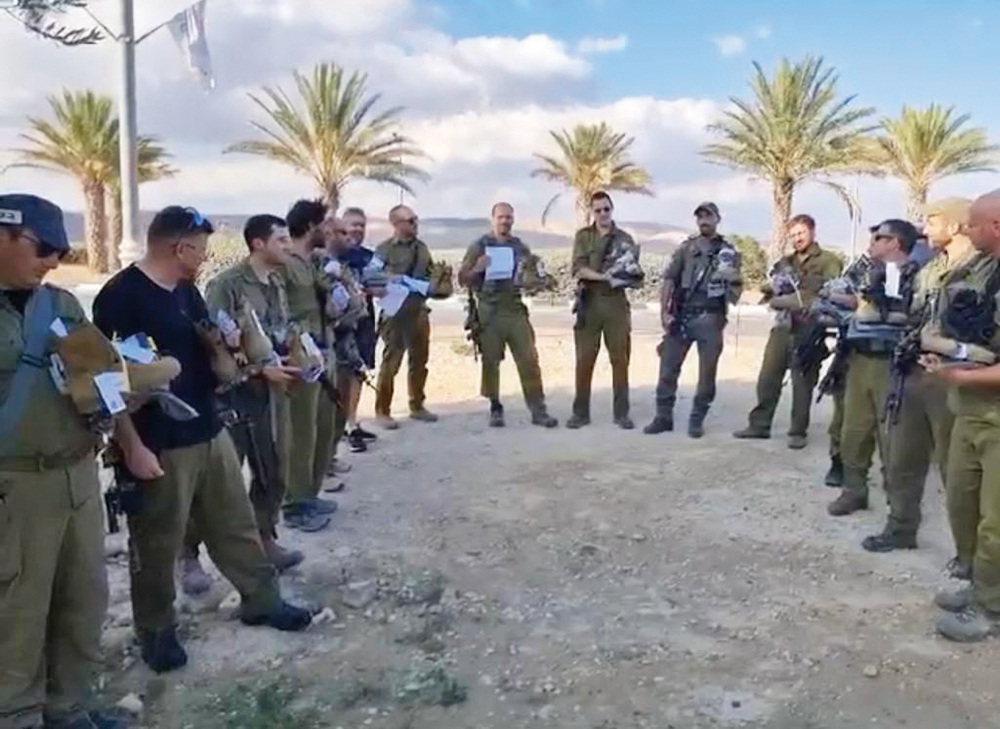
“Our chayalim, our nieces, nephews, cousins, brothers, don’t have the opportunity to take off their boots now. They live in them—for weeks straight at a time,” Wachstock explained.
Wachstock added that a few weeks ago, when the IDF got two hostages back after a fierce battle, the hostages had no shoes. Two soldiers took off their own boots, which were supplied by “Boots for Israel,” and gave them to the hostages to wear as they got out of harm’s way.
Wachstock proudly relayed that his team has managed to raise $2 million so far. But they have spent $2.1 million. Also, he said, “I have 5,423 exact boot requests, including the sizes of the soldiers that we don’t yet have the solution for.”
After Wachstock finished speaking, his team brought out the boots, cable ties, Gatorade pouches, granola bars, and stationery and pens. They instructed everyone that when taking the boots out of their shoe boxes, they should zip-tie the pair together, put the snacks in one boot, and write a letter to then fold up and put in the other boot. He shared that last week, several days after Ma’ayanot packed the boots and inserted their letters, a student called him to say that she had included her WhatsApp number in her letter and the chayal who received it actually called to thank her.
At YINR, the WTA eighth graders brought the cartons onto the tables, and together the kids and YINR members wrote the letters, organized and packed the boots.
“We have spent many Sundays through Thursdays packing boots in a warehouse,” said Ronit Farber, a volunteer. “Now that we are running out of boots, we are working on fundraising for more.”
Steve Baruch, a retiree who has become a serious volunteer added, “I feel like these are my boys. It could be my children or grandchildren putting their lives on the line. We get a lot more than we give by doing this.”

Mark Spector, another retiree and full-time volunteer, reflected, “Here was an opportunity to do something tangible. If you go into Gaza, you’ve got to have good shoes on your feet.”
He concluded by quoting Psalms: “‘They [the enemy] trust in chariots and some in horses, but we trust in the name of the Lord our God. They collapse and fall, but we rise and stand upright.’ Jewish people around the world are uniting—we are standing upright.’”
To donate, visit thechesedfund.com/bootsontheground/bootsforisrael.










